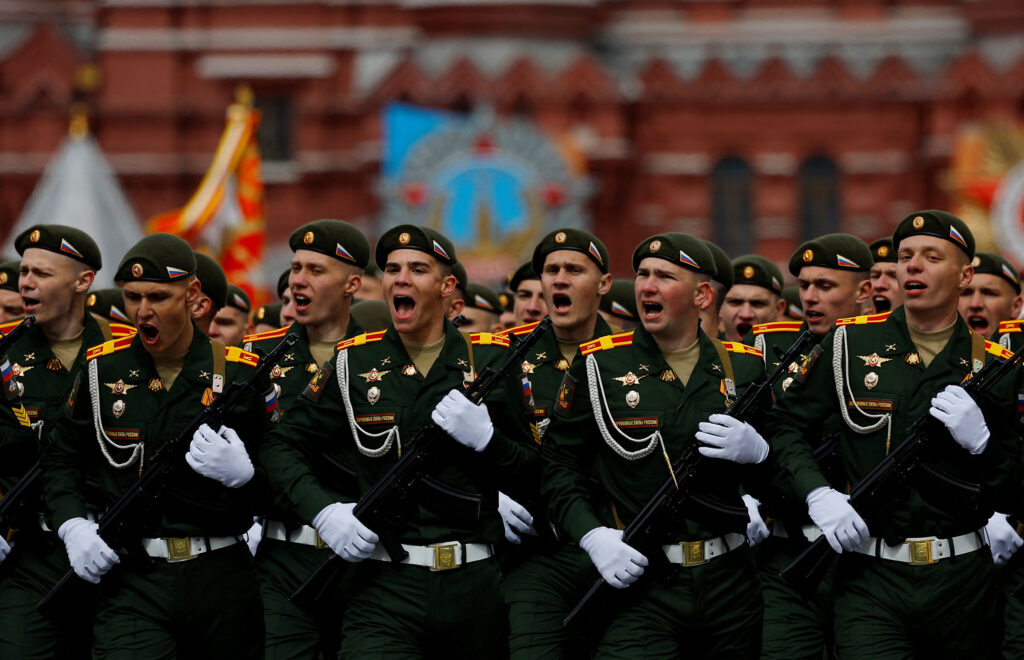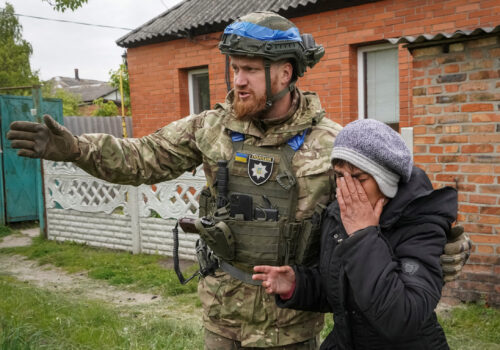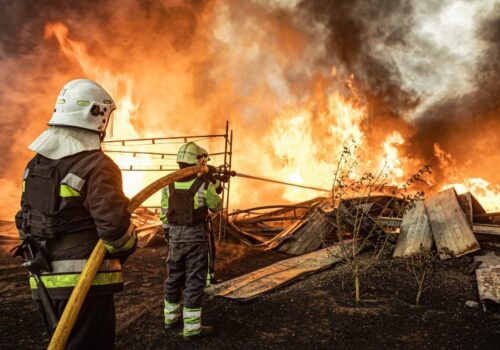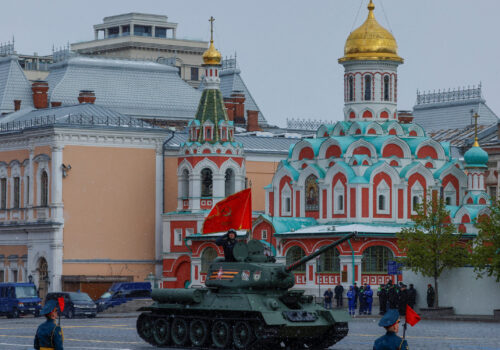Since the launch of Russia’s full-scale invasion more than two years ago, Western military support for Ukraine has been plagued by endless delays, restrictions, and half-measures. This underwhelming response has typically been blamed on concerns over possible Russian retaliation and the desire to avoid a wider war. In reality, however, some Western leaders may also be motivated by perceptions of Russian weakness rather than fear of Russian strength.
This was the argument set out by Ukrainian President Volodymyr Zelenskyy last week as he bemoaned the inadequate Western reaction to Russia’s invasion. Speaking to journalists in Kyiv, Zelenskyy said he believes Ukraine’s partners “are afraid of Russia losing the war” because this would lead to “unpredictable geopolitical consequences.”
Zelenskyy’s comments are not entirely new, of course. There have long been suggestions that the West’s hesitant approach to aiding Ukraine reflects worries that a Russian defeat could lead to the fall of the Putin regime. Some have even speculated that the Russian Federation itself would be unlikely to survive, and would instead break up into a number of new states, in a continuation of the process that began in 1991.
It is easy enough to imagine why Western policymakers might be alarmed by the prospect of a new Russian collapse. Indeed, the Western response to the disintegration of the USSR was equally cautious, with US President George H. W. Bush traveling to Ukraine on the eve of the country’s declaration of independence in August 1991 to deliver his infamous “Chicken Kiev speech” warning against “suicidal nationalism.”
President Bush was far from alone in prioritizing geopolitical stability over the statehood aspirations of Ukraine and the USSR’s other captive nations. One year earlier, British Prime Minister Margaret Thatcher had visited Ukraine and offered a similarly skeptical view of the country’s independence struggle. Bush and Thatcher were primarily concerned with the fate of the Soviet Union’s colossal war machine and vast nuclear arsenal. Allowing this to be redistributed among a collection of newly independent states seemed the height of recklessness. So rather than hasten the fall of the Soviet Empire, they sought to prevent or at least manage the process.
Stay updated
As the world watches the Russian invasion of Ukraine unfold, UkraineAlert delivers the best Atlantic Council expert insight and analysis on Ukraine twice a week directly to your inbox.
These same concerns are now hampering support for Ukraine as it fights against Vladimir Putin’s efforts to reverse the verdict of 1991. But is today’s Russia really at risk of collapse?
The Wagner mutiny of June 2023 would certainly suggest that Putin’s grip on the country is far more fragile than the Kremlin would like us to believe. While the mutiny was a short-lived affair, it was nevertheless revealing that rebellious troops were able to seize control of one of Russia’s largest cities without encountering opposition. Equally noteworthy was the absence of establishment figures rushing to rally around the throne. At the same time, the demands of the Wagner rebels did not amount to regime change, never mind anything that might constitute a threat to Russia’s territorial integrity. On the contrary, they sought a stronger Russia with more effective wartime leadership.
This is not to say that the break-up of the Russian Federation is impossible, of course. The invasion of Ukraine has underlined Russia’s status as the last of the great European empires, and has sparked a long overdue debate over the need for decolonization. However, talk of an impending collapse may be wishful thinking. While Russia has a history of unraveling in sudden and dramatic fashion, there is currently little evidence of serious independence movements in any of the country’s ethnic minority republics.
Rather than sparking the next stage in Russia’s long retreat from empire, defeat in Ukraine would be far more likely to bring about the fall of the Putin regime and usher in a period of national reflection and reform. This has been the case following numerous other notable Russian military defeats. After losing the Crimean War in the middle of the nineteenth century, Russia abandoned serfdom. Defeat to Japan in 1905 led to a brief flirtation with parliamentary democracy.
Meanwhile, the failed Soviet invasion of Afghanistan in the 1980s fueled public demands for reform that helped end the Cold War. If the current invasion also ends in defeat, there is every reason to believe Russia will survive intact. After all, while a retreat from Ukraine would be deeply wounding for Russian national pride, it would hardly pose an existential threat to Russia itself.
Eurasia Center events

Rather than scaring themselves into self-deterrence with nightmare scenarios of future Russian collapse, Western leaders should be laser-focused on the far more immediate dangers posed by Russian victory. After a series of initial setbacks, the Russian army has now regained the initiative in Ukraine and is advancing. Putin is more confident than ever and is clearly preparing his entire country to wage a long war of attrition. Unless the West dramatically increases its military support for Ukraine, there is every chance he will succeed.
If Putin achieves victory in Ukraine, he will almost certainly go further. The Kremlin dictator is already boasting of his Ukrainian “conquests” and comparing himself to all-conquering eighteenth century Russian Czar Peter the Great. At the beginning the war, Putin had sought to frame the invasion as a defensive measure by blaming it on NATO expansion and imaginary “Ukrainian Nazis.” As his battlefield fortunes have improved, he has begun to talk openly of reclaiming “historically Russian lands.”
As anyone with a passing knowledge of Russian history will confirm, there are currently at least a dozen other countries beyond Ukraine that could also fit Putin’s definition of “historically Russian lands.” The list of potential targets includes Finland, Poland, the Baltic states, Belarus, Moldova, Georgia, Azerbaijan, Armenia, and the whole of Central Asia. None of these countries can feel safe. Putin’s entire reign has been defined by his desire to reestablish Russia as a Great Power and end the era of Western domination. If he achieves victory in Ukraine, it is ludicrous to suggest he will simply stop.
Some commentators are inclined to downplay the risk of further invasions by pointing to the poor performance of the Russian army in Ukraine and claiming that Russia is in no position to engage in further military adventures. Unfortunately, such arguments fail to take into account the impact of Russian success in Ukraine. A Russian victory would transform the geopolitical climate, leading to a surge in international support for the Kremlin and the demoralization of the West. Countries throughout the Global South would abandon neutrality and rush to foster closer ties with Moscow.
In material terms, the Russian conquest of Ukraine would have even more profound consequences for European security. Putin already commands Europe’s largest army. With Ukraine subjugated, he would also have control over Europe’s second-largest army, along with Ukraine’s long neglected but rapidly reviving military-industrial capabilities. Possession of Ukraine’s fabled black earth would make Russia the dominant power on global agricultural markets, providing Putin with a formidable tool to bribe and blackmail the international community.
Even if a victorious Russia did not immediately embark on new conquests, every government in Europe would be obliged to radically increase defense spending. Many are just starting to rearm now in reaction to the Russian war against Ukraine. Expenditures could soon rise far beyond the current cost of arming Ukraine. There would also be a very real danger of a new nuclear arms race. Given the evident effectiveness of Putin’s naked nuclear blackmail in deterring the West from aiding Ukraine, it would be entirely logical for other nations to conclude that they will only be truly safe with a nuclear deterrent of their own.
The international repercussions of a Russian victory in Ukraine would be equally disastrous. Autocrats around the world would view Putin’s triumph as a sign of unprecedented Western weakness and an open invitation to pursue their own expansionist agendas. The period of relative peace and progress that followed the end of the Cold War would be replaced by a new era of international instability and insecurity.
None of this is inevitable. Russia can still be defeated in Ukraine if the West takes the decisive step of committing itself to Ukrainian victory. This means supplying Ukraine with sufficient weapons to not only defend itself but to actually defeat Russia. Crucially, it means ending absurd restrictions on the use of Western weapons and allowing strikes on legitimate military targets inside Russia. And it means providing Ukraine with the kind of guaranteed long-term military support that will convince Putin his hopes of outlasting the West are futile.
Confronting the Kremlin effectively will require considerable political will and courage. Russia will inevitably respond to any hardening of Western resolve by escalating its nuclear intimidation tactics, but the usefulness of nuclear saber-rattling diminishes when Western governments don’t allow such threats to cloud their strategic calculus.
It is now painfully obvious that the hesitancy and indecisiveness of the past two years have not succeeded in appeasing Putin or reducing the challenge posed by a resurgent Russia. Instead, the West is now facing the very real prospect of a defeat that would have catastrophic consequences for the future of international security. In order to avert disaster, Putin must lose in Ukraine. Any worries about the future of the Russian Federation will have to wait until this far more urgent threat has been addressed.
Peter Dickinson is editor of the Atlantic Council’s UkraineAlert service.
Further reading
The views expressed in UkraineAlert are solely those of the authors and do not necessarily reflect the views of the Atlantic Council, its staff, or its supporters.

The Eurasia Center’s mission is to enhance transatlantic cooperation in promoting stability, democratic values and prosperity in Eurasia, from Eastern Europe and Turkey in the West to the Caucasus, Russia and Central Asia in the East.
Follow us on social media
and support our work
Image: Russian service members march in columns during a military parade on Victory Day, which marks the 79th anniversary of the victory over Nazi Germany in World War Two, in Red Square in Moscow, Russia, May 9, 2024. (REUTERS/Evgenia Novozhenina)




